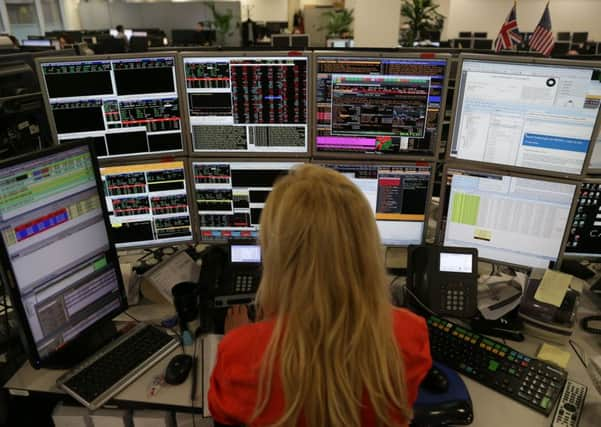Bill Jamieson: Bargain hunters keep close eye on election
This article contains affiliate links. We may earn a small commission on items purchased through this article, but that does not affect our editorial judgement.


Scarcely has the daily news been less reassuring for investors. But instead share prices have been brushing record highs. On Friday the FTSE 100 Index closed at 7,547.63, up 0.23 per cent on the week and 27 per cent higher than its 12-month low.
Even if investors rate a hung parliament and the prospect of a Jeremy Corbyn-led coalition as a low probability, concern over an economic hit from a poor Brexit outcome must surely have triggered some profit-taking by now. Even more puzzling is the behaviour of the UK bond market. Traditionally, when there are worries about inflation and threats to the UK economy, the prices of government bonds fall and their yields rise. But today the yield on the two-year government bond maturing when Brexit talks are due to complete in 2019 is just 0.12 per cent.
• READ MORE: Markets and economy
Advertisement
Hide AdAdvertisement
Hide AdSuch low yields are historically associated with periods of benign calm in markets and with low levels of concern about our economic outlook. But can this really be said to be a fair reflection of the outlook today? Quite the opposite. Share prices are at near peaks and bond yields at outstanding lows for a reason. It is that, so uncertain has the outlook become, and business confidence so prone to any Brexit-related setback, that the Bank of England is now more likely to keep interest rates at ultra-low levels. Indeed, it voted less than a month ago by a majority of seven to one to keep the official rate at just 0.25 per cent.
Contrary to all expectation, the Bank has kept the cost of money at an emergency low rate below 1 per cent for eight years – an astonishingly long period. And it continues to do so for fear that any sharp upward move would spark a sharp drop in business and consumer confidence and a fall in the stock market. Thus for the moment the consumer has continued to drive the economy, helped by low debt interest costs that have encouraged a resort to record levels of credit card debt.
At the same time, worries about a much smaller-than-expected Conservative majority this Thursday has brought a fall in the value of sterling. In other circumstances this, too, might have occasioned a stock market sell-off on fears of resulting higher inflation. Instead, investors have accorded more weight to the enhanced competitiveness of UK exports.
The result has been that a KPMG index of those quoted companies on the London stock market generating 70 per cent of their earnings abroad has risen almost 30 per cent since the EU referendum, while its index of UK companies earning at least 70 per cent of revenues in sterling has only just turned positive for the first time since the Brexit vote.
This would suggest, warns the FT’s Long View columnist Michael Mackenzie, that investors in UK-facing companies are bracing themselves for a hard Brexit. So for the moment the Bank of England seems trapped in a prolonged game of chicken – relying on a continuing period of rock bottom interest rates to keep up business and household morale.
More immediately the prospect of a narrow Conservative majority – or even a hung parliament – has financial markets braced for turbulence on election night. Leading investment banks including Barclays, Bank of America, Merrill Lynch and Deutsche Bank are all said to have drafted in extra staff.
Advertisement
Hide AdAdvertisement
Hide AdA Conservative majority of between 25 and 30 seats is priced in to the markets. The worst outcome would be a razor-thin majority for Theresa May, with a heartened Remain camp in the Commons and negative consequences for that tough negotiating stance that she has promised on Brexit. That would suggest a big sell-off on Friday morning. But set against this is the likelihood that the Bank will be even more encouraged to sit tight and hold interest rates at ultra-low levels.
Investors, meanwhile, should keep a sharp eye on the ratings of UK-facing companies and investment trusts specialising in them. Their ratings are broadly in line with their 12-month levels, in contrast to the narrowing of discounts among overseas funds. Indeed, some UK trusts are looking “cheaper” than they have been over the last 12 months, in some cases trading at wider discounts than in the immediate aftermath of the EU referendum result.
This may be no time for a panic sell-off but instead to keep a wary eye open for opportunistic bargain buying should markets suffer an over-reaction later this week.